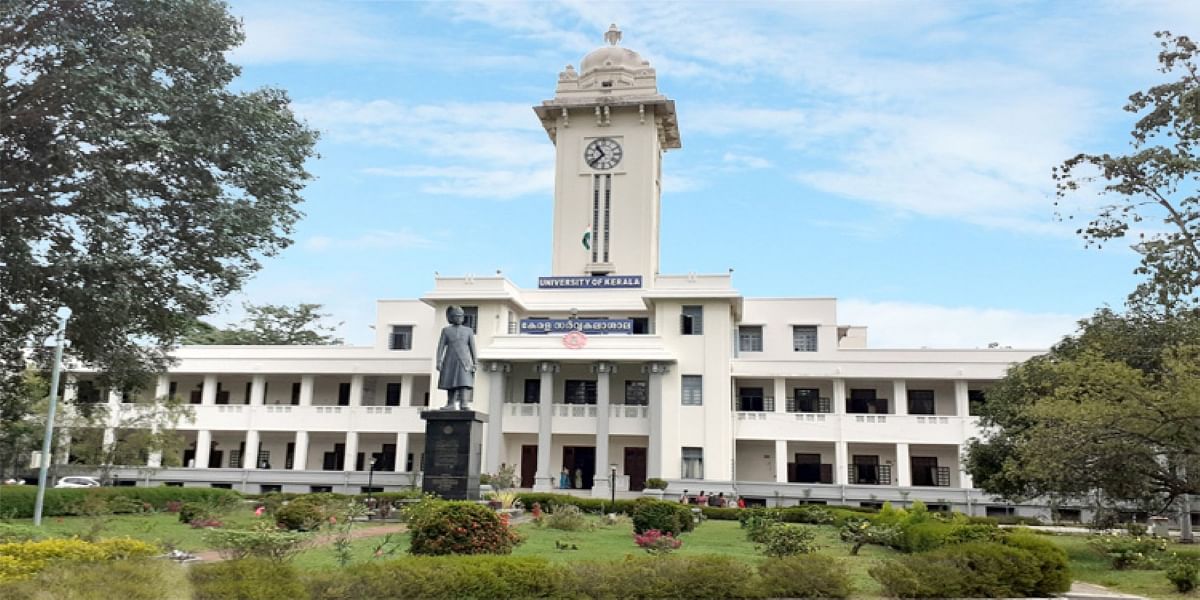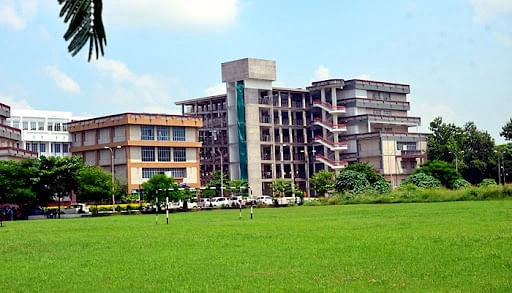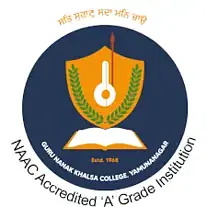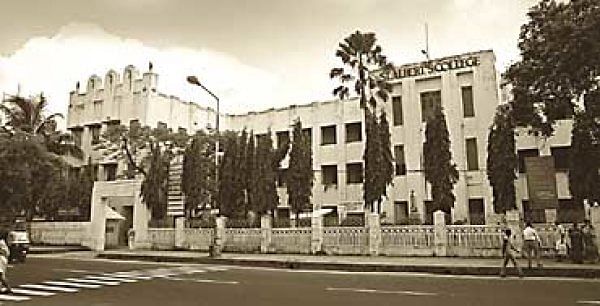B.Sc Industrial Chemistry Syllabus and Subjects

The BSc Industrial Chemistry syllabus consists of six semesters, with a course duration of three years. The industrial chemistry subjects for BSc consist of subjects such as Physics, Chemistry, Algebra, and Calculus, from the major subjects and practicals, with Biochemistry, Green Chemistry making up the electives of the course.
The Industrial Chemistry syllabus is well-structured and industry-oriented. The B.Sc Industrial Chemistry course is designed to form a capable workforce with job opportunities such as Fermentation Operator, Technician, Medical Assistant, etc.
Table of contents
- Semester Wise BSc Industrial Chemistry Syllabus
- B.Sc Industrial Chemistry Subjects
- B.Sc Industrial Chemistry Reference Books
Semester Wise BSc Industrial Chemistry Syllabus
The Industrial Chemistry syllabus is organised into six semesters and covers theoretical and practical knowledge of Chemistry, Industrial Chemistry, Physics, and Algebra. The table below summarises the BSc Industrial Chemistry syllabus by semester.
B.Sc 1st Year Industrial Chemistry Syllabus
The table below contains BSc Industrial Chemistry syllabus for 1st year:
|
Semester I |
Semester II |
|
Chemistry-I |
Chemistry ll |
|
Physics-1: Mechanics |
Calculus and Matrices |
|
Industrial Chemistry-I |
Industrial Chemistry-II |
|
Industrial Aspects of Organic and Inorganic chemistry |
Unit operations, Utilities, Fluid Flow and Heat Transport in Chemical Industry |
|
Environmental Studies |
Technical writing and Communication in English |
BSc Industrial Chemistry syllabus Practicals for 1st year
BSc Industrial Chemistry syllabus contain a list of practical for 1st year which is given below:
- Chemistry
- Physics
- Industrial Chemistry
B.Sc 2nd Year Industrial Chemistry Syllabus
The table below contains BSc Industrial Chemistry syllabus for 2nd year:
| Semester III |
Semester IV |
|
Chemistry lII |
Chemistry lV |
|
Algebra |
Physics-II : Wave and Optics |
|
Industrial chemistry lII |
Industrial chemistry lV |
|
Material science and Industrial Pollution |
Food Chemistry |
BSc Industrial Chemistry syllabus Practicals for 2nd year
BSc Industrial Chemistry syllabus contain a list of practical for 2nd year which is given below:
- Chemistry
- Physics
- Industrial Chemistry
B.Sc 3rd Year Industrial Chemistry Syllabus
The table below contains BSc Industrial Chemistry syllabus for 3rd year:
|
Semester V |
Semester VI |
|
Chemistry V |
Chemistry VI |
|
Inorganic Chemistry - I |
Inorganic Chemistry – II |
|
Industrial chemistry ll |
Industrial chemistry Vl |
|
Industrial Chemical Analysis |
Chemical Process Economics and Entrepreneurship |
BSc Industrial Chemistry syllabus Practicals for 3rd year
BSc Industrial Chemistry syllabus contain a list of practical for 3rd year which is given below:
- Chemistry
- Physics
- Industrial Chemistry
B.Sc Industrial Chemistry Subjects
The Industrial Chemistry subjects impart knowledge on important topics such as Chemistry, Physics, Calculus, Algebra and Industrial Chemistry. BSc Industrial Chemistry has classified all the science subjects as core, labs, and elective, which are given in the list below:
BSc Industrial Chemistry Core Subjects
The industrial chemistry subjects contain a list of core subjects, which is given in the list below:
- Chemistry
- Physics
- Industrial Chemistry
- Algebra
- Differential Equations
BSc Industrial Chemistry Elective Subjects
The list below shows the skill-based and discipline-specific electives offered in industrial chemistry subjects.
- Polymers
- Pharmaceuticals
- Green Chemistry
- Forensic Science
- Applied Chemistry
- Nano Chemistry
BSc Industrial Chemistry Subjects In Detail
The BSc Industrial Chemistry subjects focus on topics ranging from physics and chemistry to Industrial Chemistry. In the table below, the industrial chemistry subjects are described in detail:
| BSc Industrial Chemistry subjects | Topics |
| Chemistry | Inorganic Chemistry, Organic Chemistry, Physical Chemistry. |
| Physics | Vector calculus, Mechanics, Special Theory of Relativity, Oscillations and Waves, Wave Optics, Electrostatics, Magnetostatics, Electromagnetic Induction and electromagnetic Waves. |
| Industrial Chemistry | Chemical Technology, Industrial Gases and Inorganic Chemicals, Environment, Fuel Chemistry, Oils and Fats, Food additives, Silicate Industries. |
| Algebra | Groups, Rings, Vector spaces, Linear Transformations on real and complex vector spaces. |
| Biochemistry | Carbohydrates, ß Proteins, Enzymes, Lipids, Structure of DNA (Watson-Crick model) and RNA. |
B.Sc Industrial Chemistry Course Structure
The B.Sc Industrial Chemistry syllabus has a core structure that consists of core, labs, and elective subjects, respectively. The colleges follow the CBCS format as per UGC guidelines. Candidates are required to submit lab reports and projects based on observations from the practicals. In short, the course structure format is as follows:
- VI Semesters
- Core subjects
- Elective subjects
- Internship
- Project Submission
B.Sc Industrial Chemistry Teaching Methodology and Techniques
BSc Industrial Chemistry teaching methodology involves candidates observing, demonstrating, and utilizing techniques for mixing and chemical reactions. In short, the teaching methods include:
- Lectures
- Chemistry Lectures
- Workshops
- Tutorials
- Electronic Resources
- Laboratory work and Practical Sessions
B.Sc Industrial Chemistry Projects
The syllabus of Industrial Chemistry in the final year contains projects or dissertations. The projects are divided into several parts and distributed to the group formed for the project work. Thus, aspirants work together to solve and gain experience from the projects, which helps them in the future. Mentioned below is the list of projects work:
- Production of mosquito repellent insecticides using orange peels.
- Screening of white star apple seed oil characterization, extractions, and antimicrobial.
- Phytochemical and antimicrobial analysis of mistletoe leaves.
- Analysis assignment on water pollution with phosphate.
- Starch productions from cassava and cross derivatives links
B.Sc Industrial Chemistry Reference Books
The Industrial Chemistry syllabus consists of a list of reference books which is given in the table below:
|
Books |
Authors |
|
Riegel's Handbook of Industrial Chemistry |
Kent J.A. |
|
Handbook of Industrial Chemistry |
M. Ali, Bassam El Ali |
|
Ullmann's Encyclopedia of Industrial Chemistry |
Hans-Jürgen Arpe |
|
Industrial Polymer Applications |
William R Ashcroft |
|
Reverse Osmosis |
Zahid Amjad |
Top B.Sc Industrial Chemistry Colleges
Top Science Entrance Exams
B.Sc Industrial Chemistry Fee Structure
FAQs on B.Sc Industrial Chemistry Syllabus and Subjects
Q: What are the subjects in BSc industrial chemistry?
Q: What is industrial chemistry in BSc?
Q: What is the difference between BSC chemistry and industrial chemistry?
Q: Is industrial chemistry same as chemical engineering?























